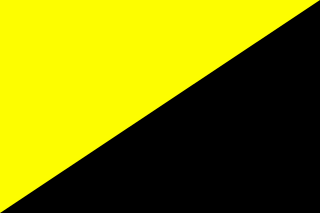
Anarcho-capitalism is an anti-statist, libertarian political philosophy and economic theory that seeks to abolish centralized states in favor of stateless societies with systems of private property enforced by private agencies, based on concepts such as the non-aggression principle, free markets and self-ownership. An anarcho-capitalist philosophy extends the concept of ownership to include control of private property as part of the self, and, in some interpretations, control of other people as private property only if they voluntarily granted such control. In the absence of statute, anarcho-capitalists hold that society tends to contractually self-regulate and civilize through participation in the free market, which they describe as a voluntary society involving the voluntary exchange of goods and services. In a theoretical anarcho-capitalist society a system of private property would still exist, and would be enforced by private defense agencies and/or insurance companies that were selected by property owners, whose ownership rights or claims would be enforced by private defence agencies and/or insurance companies. These agencies or companies would operate competitively in a market and fulfill the roles of courts and the police, similar to a state apparatus. Some anarcho-capitalist authors have argued that slavery is compatible with anarcho-capitalist ideals.
In economics, the free-rider problem is a type of market failure that occurs when those who benefit from resources, public goods and common pool resources do not pay for them or under-pay. Examples of such goods are public roads or public libraries or other services or utilities of a communal nature. Free riders are a problem for common pool resources because they may overuse it by not paying for the good. Consequently, the common pool resource may be under-produced, overused, or degraded. Additionally, it has been shown that despite evidence that people tend to be cooperative by nature, the presence of free-riders causes cooperation to deteriorate, perpetuating the free-rider problem.
This aims to be a complete article list of economics topics:

In economics, a public good is a good that is both non-excludable and non-rivalrous. Use by one person neither prevents access by other people, nor does it reduce availability to others. Therefore, the good can be used simultaneously by more than one person. This is in contrast to a common good, such as wild fish stocks in the ocean, which is non-excludable but rivalrous to a certain degree. If too many fish were harvested, the stocks would deplete, limiting the access of fish for others. A public good must be valuable to more than one user, otherwise, its simultaneous availability to more than one person would be economically irrelevant.
The threshold pledge or fund and release system is a way of making a fundraising pledge as a group of individuals, often involving charitable goals or financing the provision of a public good. An amount of money is set as the goal or threshold to reach for the specified purpose and interested individuals will pitch in, but the money at first either remains with the pledgers or is held in escrow.

Collective action refers to action taken together by a group of people whose goal is to enhance their condition and achieve a common objective. It is a term that has formulations and theories in many areas of the social sciences including psychology, sociology, anthropology, political science and economics.

The public sector, also called the state sector, is the part of the economy composed of both public services and public enterprises. Public sectors include the public goods and governmental services such as the military, law enforcement, infrastructure, public transit, public education, along with health care and those working for the government itself, such as elected officials. The public sector might provide services that a non-payer cannot be excluded from, services which benefit all of society rather than just the individual who uses the service. Public enterprises, or state-owned enterprises, are self-financing commercial enterprises that are under public ownership which provide various private goods and services for sale and usually operate on a commercial basis.

In general, incentives are anything that persuade a person or organization to alter their behavior to produce the desired outcome. The laws of economists and of behavior state that higher incentives amount to greater levels of effort and therefore higher levels of performance. For comparison, a disincentive is something that discourages from certain actions.

An economic system, or economic order, is a system of production, resource allocation and distribution of goods and services within a society. It includes the combination of the various institutions, agencies, entities, decision-making processes, and patterns of consumption that comprise the economic structure of a given community.

Alexander Taghi Tabarrok is a Canadian-American economist. Tabarrok is a professor at Virginia's George Mason University and Bartley J. Madden Chair in Economics at the school's Mercatus Center.

The principal–agent problem refers to the conflict in interests and priorities that arises when one person or entity takes actions on behalf of another person or entity. The problem worsens when there is a greater discrepancy of interests and information between the principal and agent, as well as when the principal lacks the means to punish the agent. The deviation from the principal's interest by the agent is called "agency costs".

Anarchy, State, and Utopia is a 1974 book by the American political philosopher Robert Nozick. It won the 1975 US National Book Award in category Philosophy and Religion, has been translated into 11 languages, and was named one of the "100 most influential books since the war" (1945–1995) by the UK Times Literary Supplement.

Erik Lindahl was a Swedish economist. He was professor of economics at Uppsala University 1942–58 and in 1956–59 he was the President of the International Economic Association. He was an also an advisor to the Swedish government and the central bank, and in 1943 was elected as a member of the Royal Swedish Academy of Sciences. Lindahl posed the question of financing public goods in accordance with individual benefits. The quantity of the public good satisfies the requirement that the aggregate marginal benefit equals the marginal cost of providing the good.

The public goods game is a standard of experimental economics. In the basic game, subjects secretly choose how many of their private tokens to put into a public pot. The tokens in this pot are multiplied by a factor and this "public good" payoff is evenly divided among players. Each subject also keeps the tokens they do not contribute.

In economics, excludability is the degree to which a good, service or resource can be limited to only paying customers, or conversely, the degree to which a supplier, producer or other managing body can prevent consumption of a good. In economics, a good, service or resource is broadly assigned two fundamental characteristics; a degree of excludability and a degree of rivalry.
The term in kind generally refers to goods, services, and transactions not involving money or not measured in monetary terms. It is a part of many spheres, mainly economics, finance, but also politics, work career, food, health and others. There are many different types of in kind actions throughout the mentioned branches, which can be identified and distinguished.
A private defense agency (PDA) is a theoretical enterprise which would provide personal protection and military defense services to individuals who would pay for its services. PDAs are advocated in anarcho-capitalism as a way of enforcing the system of private property.
A collective action problem or social dilemma is a situation in which all individuals would be better off cooperating but fail to do so because of conflicting interests between individuals that discourage joint action. The collective action problem has been addressed in political philosophy for centuries, but was most clearly established in 1965 in Mancur Olson's The Logic of Collective Action.

Consideration is a concept of English common law and is a necessity for simple contracts but not for special contracts. The concept has been adopted by other common law jurisdictions.

The history of insurance traces the development of the modern business of insurance against risks, especially regarding cargo, property, death, automobile accidents, and medical treatment.












